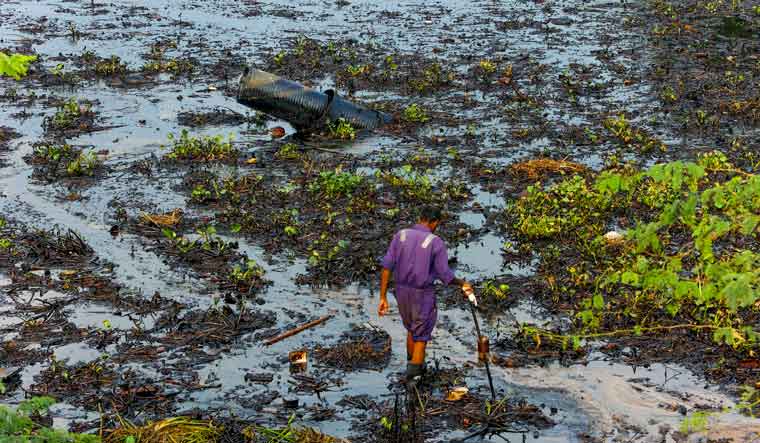A weak after cyclone Michaung wreaked havoc in Chennai, life has turned into a nightmare for the residents and fisherfolk of Ennore, 25 km north of Chennai.
While the residents are fighting to get back to normal life, fishermen in the region have not ventured yet into sea as the catch also smell of oil. The oil contamination is likely to affect the normal life of residents and the livelihood of fishermen for the next three to four months.
The spillage from the Chennai Petroleum Corporation Limited refinery spread over 20 square kilometres, throwing life out of gear. As the cyclone brought heavy rains, about 40,000 cusecs of water was released from the Poondi and Puzhal lakes which caused flooding in these areas. But the flood water brought along with it oil and chemicals. Even after the water receded, thick stains of oil remain on the roads, walls, doors and every equipment inside homes. More than 1,000 families living in Ernavur, Adi Dravidar colony, Thiruveethi Amman Koil and the fishing villages in Ennore have been severely affected.
“We have seen floods earlier. In 2015 also we were affected by floods. There was five feet water even then. We recovered from the flood then. But this time, the floods have put us in huge trouble. The oil spill has made life very difficult for us,” says 38-year old Rathnakumar, a resident of Adi Dravidar Nagar in Ennore.
“I have lost everything. The electronic items at home, school books, documents are all lost due to the oil traces. I managed to clean the flood water. But the oil traces continue to stay. The stench remains even after cleaning. I don’t know what to do now,” he says as he shows the stain on the refrigerator in his house.
Though they cleaned the house, the stickiness on the floor has made life difficult for his wife and daughter. Kumar who works as a supervisor in a construction site in the city had to move out of the house with his family. “My wife and daughter are at my relative's place in Chennai. I was also there. We moved out when the water started coming in. But now I don’t know what to do. I cant bring them back home,” tells Kumar.
The residents are also facing several health hazards including suffocation due to the odour and burning sensation in their eyes.
TNPCB and coast guard investigation
After conducting an aerial survey of the Ernavur area in Ennore, the Indian coast guard reported that “the spill has extended at sea from Kosasthalaiyar river mouth till Kasimedu harbour, extending to about 20 square kilometres". The coastal area from Ennore to Kasimedu harbour is a dense fishing area and supports thousands of livelihoods. Oil spill in the area could result in disastrous effects of damaging the fragile environment and irreparable loss to the ecosystem.
The Tamil Nadu Pollution Control Board (TNPCB) in its investigation report said that it found traces of oil in the water. “The spilt oil continued its way, engulfed the city drains, Ennore creeks and entire coastal sea area through Kosathalaiyar river mouth,” TNPCB said. However, while representing the case in the National Green Tribunal (NGT), the CPCL on Tuesday blamed the TNPCB for coming out with an incomplete report.
Blame game continues
CPCL has reportedly engaged fishermen to clean up the oil. “Due to the incessant rains caused by cyclone Michaung there was unprecedented flooding inside the CPCL refinery in Manali. Presently water levels have receded. There was no pipeline leak from the refinery. We are investigating the matter,” CPCL said. With no protective gear the fishermen were seen cleaning the oil using mugs.
Meanwhile, responding to the sharp queries raised by judges Pushpa Sathyanarayana and Sathyagopal Koralapati, CPCL and government agencies blamed each other for the situation. The NGT, which came down heavily on the oil companies and the government agencies including the pollution control board, directed them to submit the report before December 14. CPCL informed the court that TNPCB came with an incomplete report and government authorities were not allowing its officials to enter the plant. The oil company also informed the tribunal that it had already started removing the oil patches from the refinery since December 7 and will be cleared by December 20.
On the other hand, the state government submitted the test reports of the water samples collected from the south gate of CPCL and the Ennore creek. The NGT, besides stating that the tribunal is “unhappy” with the measures taken to control the oil spread, stressed on providing protective gear to the fishermen who are engaged in cleaning.
Environmental activists, however, are of the opinion that both the pollution control board and the oil company are at fault. “The regulatory authority underplayed the situation. Underplaying the system only increases the risk. CPCL says there is no pipeline leak, while TNPCB says there are oil traces. It is a huge environmental problem,” environmental activist Nithyanand Jeyaraman tells The Week. He says the government should now ensure that the oil spread is contained, and take measures for safe disposal of the oil.
“This shows the lethargy of the CPCL. The oil company at the first instance should not have kept oil in the refinery. It is the oil that was kept inside the premises that flowed out along with the flood waters,” says G. Sundarrajan of Poovulagin Nanbargal, an environmental organisation.
Remediation and compensation to the people of the region are also top priorities.



